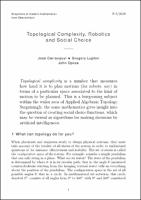| dc.contributor.author | Carrasquel, José | |
| dc.contributor.author | Lupton, Gregory | |
| dc.contributor.author | Oprea, John | |
| dc.contributor.editor | Cooper, Andrew A. | |
| dc.contributor.editor | Cederbaum, Carla | |
| dc.date.accessioned | 2018-08-10T09:46:48Z | |
| dc.date.available | 2018-08-10T09:46:48Z | |
| dc.date.issued | 2018-08-10 | |
| dc.identifier.uri | http://publications.mfo.de/handle/mfo/1384 | |
| dc.description.abstract | Topological complexity is a number that measures
how hard it is to plan motions (for robots, say) in
terms of a particular space associated to the kind of
motion to be planned. This is a burgeoning subject
within the wider area of Applied Algebraic Topology.
Surprisingly, the same mathematics gives insight into
the question of creating social choice functions, which
may be viewed as algorithms for making decisions by
artificial intelligences. | en_US |
| dc.language.iso | en | en_US |
| dc.publisher | Mathematisches Forschungsinstitut Oberwolfach | en_US |
| dc.relation.ispartofseries | Snapshots of modern mathematics from Oberwolfach;2018,05 | |
| dc.rights | Attribution-ShareAlike 4.0 International | * |
| dc.rights.uri | http://creativecommons.org/licenses/by-sa/4.0/ | * |
| dc.title | Topological Complexity, Robotics and Social Choice | en_US |
| dc.type | Article | en_US |
| dc.identifier.doi | 10.14760/SNAP-2018-005-EN | |
| local.series.id | SNAP-2018-005-EN | en_US |
| local.subject.snapshot | Geometry and Topology | en_US |
| dc.identifier.urn | urn:nbn:de:101:1-2018082015100294008165 | |
| dc.identifier.ppn | 1655211218 | |


